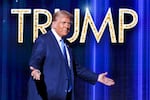
President-elect Donald Trump takes the stage before he speaks at the FOX Nation Patriot Awards on Dec. 5 in Greenvale, N.Y.
Heather Khalifa
President-elect Donald Trump doubled down on levying tariffs in his first days in office, minimizing his prior emphasis on retribution against his perceived enemies, in his first network interview since he won the election.
Trump spoke on NBC News' Meet The Press with Kristen Welker about his vows to implement his top campaign promises — deporting all those in the U.S. illegally, pardoning Jan. 6 rioters and extending major tax cuts.
Trump also promised he won’t restrict access to abortion pills and hopes to find a legislative solution that keeps “Dreamers” in the country legally. Dreamers are undocumented immigrants brought to the U.S. as children who have legal status under an executive action from former President Barack Obama.
When asked about going after President Joe Biden after inauguration on Jan. 20, Trump said he won’t focus on the “past.”
“Retribution will be through success,” Trump told Welker. “I’m looking to get — bring prices down. Because … I won on the border, and I won on groceries.”
Related: Trump threatens to impose sweeping new tariffs on Mexico, Canada and China on first day in office
Trump had previously threatened to investigate, prosecute, imprison or otherwise punish his perceived enemies, including Biden.
The president-elect maintained his plans to levy heavy tariffs on the nation’s top trading partners such as Mexico, Canada and China. When asked about whether this would increase prices for consumers, as many economists have warned, Trump said: “I can’t guarantee anything. I can’t guarantee tomorrow.”
When pressed further by Welker on the fact that tariffs from his first administration cost Americans $80 billion, the president-elect pushed back, saying tariffs “cost Americans nothing” and can even be a tool of diplomacy.
“I have stopped wars with tariffs by saying, ‘You guys want to fight, it’s great. But both of you are going to pay tariffs to the United States at 100%’,” Trump said, without providing evidence of any wars he stopped.
Spending cuts, immigration
Trump has often pointed to tariffs as a source of revenue for the federal government to offset the losses due to his tax cuts in the first term. He has also promised to drastically cut federal spending through the Department of Government Efficiency — an outside group led by tech billionaire Elon Musk and former presidential candidate Vivek Ramaswamy. Trump said Social Security and Medicare are not on the chopping block.
“I said to people we’re not touching Social Security, other than we make it more efficient,” Trump said. “But the people are going to get what they’re getting.”
On the topic of health care, Trump did not offer a clear path forward. During his first presidency, Trump spent his first months in office trying to repeal and replace the Affordable Care Act.
Related: Trudeau says Trump would raise prices on Americans if he follows through on Canada tariff threat
When asked if he’d do the same this time around Trump said, “Obamacare stinks. If we come up with a better answer, I would present that answer to Democrats and to everybody else and I’d do something about it.”
Immigration remains a top priority for Trump. During the NBC interview, he stood by his plans to implement mass deportations of people living in the U.S. illegally. Trump said he’d start with convicted criminals, but he’d go beyond that group.
“Well, I think you have to do it, and it’s a hard — it’s a very tough thing to do,” Trump said. “It’s — but you have to have, you know, you have rules, regulations, laws. They came in illegally.”
When asked if he wants Dreamers — those brought to the country as children and registered to the Deferred Action for Childhood Arrivals program — to stay in the U.S., Trump said, “I do. I want to be able to work something out.”
On abortion, Trump continued to acknowledge to political potency of the issue and said he would not get in the way of abortion pill distribution.
“Will you restrict the availability of abortion pills when you’re in office?” Welker asked.
“I’ll probably stay with exactly what I’ve been saying for the last two years,” Trump said. “And the answer is no.”